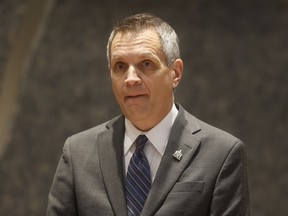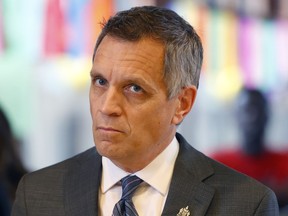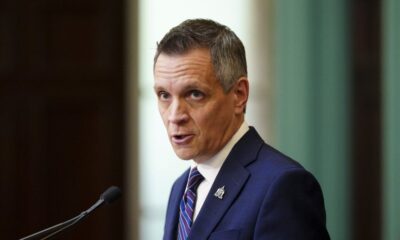Politics
Ottawa Mayor Faces Pressure to Uphold Free Speech Rights

A recent ruling from an Ottawa small claims court has highlighted concerns over free speech and public participation in city governance. The court determined that the Ottawa Police Services Board (OPSB) violated the Charter rights of residents who were unjustly restricted from voicing their opinions at public meetings. This decision raises important questions about the role of municipal leadership, specifically for Mayor Mark Sutcliffe.
In its ruling, the court addressed a controversial bylaw that allowed the OPSB chair to selectively vet and approve public submissions for meetings. The judge, Deputy Judge Sonya Notturno, found that the board’s actions were arbitrary and unfair, infringing on the freedom of expression of residents Robin Browne and Jeffrey Bradley. The two individuals had challenged the policy, claiming it effectively silenced dissenting voices while favoring supporters of the police.
The dispute originated in 2022 during a period of upheaval at the OPSB, which saw significant changes in leadership following the protests that paralyzed Ottawa. In 2023, the newly organized board amended the bylaw, leading to the current legal challenge. Browne and Bradley argued that the policy deprived them of meaningful participation in public discourse, which is vital in a democratic society.
The OPSB defended its policy, asserting that the changes were intended to enhance public participation. However, the court rejected this justification. Judge Notturno stated, “The arbitrary exercise of authority infringed on the plaintiffs’ Charter rights.” Browne was awarded $1,750, while Bradley received $750 in damages, although the monetary aspect of the case was not the primary focus for the plaintiffs.
The implications of this ruling extend beyond financial compensation. Browne emphasized that the case was about public accountability, urging the OPSB to rescind the bylaw entirely. He stated, “Public accountability means you have to listen to people even if you don’t like what you hear.” This sentiment reflects a broader demand for transparency and inclusivity in government processes.
As pressure mounts on Mayor Sutcliffe, the expectation is clear: he must demonstrate leadership and advocate for the removal of restrictions that inhibit free speech at public meetings. Critics argue that if the previous council could make significant changes to the OPSB, the current administration has a responsibility to rectify past wrongs.
The ruling serves as a pivotal moment for the city, signaling that public bodies cannot silence citizens without consequences. It also highlights the importance of safeguarding democratic principles, ensuring that all voices are heard in public forums. The challenge now lies with Mayor Sutcliffe to uphold these values and restore faith in the city’s commitment to free expression.
The judgment sends a strong message to municipal leaders: the rights enshrined in the Charter of Rights and Freedoms must be respected, and citizens should not be excluded from participating in discussions that affect their lives. The onus is on Sutcliffe to take decisive action in response to this court ruling, potentially reshaping the relationship between the OPSB and the community it serves.
-

 Politics2 weeks ago
Politics2 weeks agoSecwepemc First Nation Seeks Aboriginal Title Over Kamloops Area
-

 World4 months ago
World4 months agoScientists Unearth Ancient Antarctic Ice to Unlock Climate Secrets
-

 Entertainment4 months ago
Entertainment4 months agoTrump and McCormick to Announce $70 Billion Energy Investments
-

 Lifestyle4 months ago
Lifestyle4 months agoTransLink Launches Food Truck Program to Boost Revenue in Vancouver
-

 Science4 months ago
Science4 months agoFour Astronauts Return to Earth After International Space Station Mission
-

 Technology3 months ago
Technology3 months agoApple Notes Enhances Functionality with Markdown Support in macOS 26
-

 Top Stories1 month ago
Top Stories1 month agoUrgent Update: Fatal Crash on Highway 99 Claims Life of Pitt Meadows Man
-

 Sports4 months ago
Sports4 months agoSearch Underway for Missing Hunter Amid Hokkaido Bear Emergency
-

 Politics3 months ago
Politics3 months agoUkrainian Tennis Star Elina Svitolina Faces Death Threats Online
-

 Politics4 months ago
Politics4 months agoCarney Engages First Nations Leaders at Development Law Summit
-

 Technology4 months ago
Technology4 months agoFrosthaven Launches Early Access on July 31, 2025
-

 Top Stories4 weeks ago
Top Stories4 weeks agoFamily Remembers Beverley Rowbotham 25 Years After Murder

















